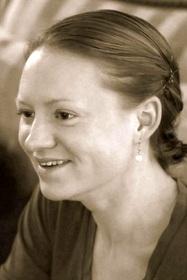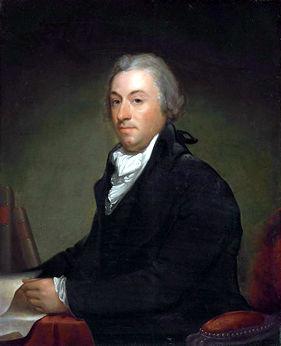
City College of New York graduate history major Emilie Gruchow discovered a handwritten draft of the "Letter of the Twelve United Colonies to the Inhabitants of Great Britain" at the Morris-Jumel Mansion, where she works as an archivist.
City College alumnus Michael Hatten, 2011, now a doctoral student at Yale University, conducted a handwriting analysis that determined that Robert R. Livingston was the author. He also concluded that the document that Ms. Gruchow found was a first draft.

Portrait of Robert R. Livingston attributed to Gilbert Stuart.
Letter drafted by Robert R. Livingston was part of ‘last-ditch effort’ by Continental Congress to reconcile with Great Britain
When City College of New York graduate history student Emilie Gruchow came upon an old, hand-written manuscript in a box at the Morris-Jumel Mansion, where she works as an archivist, she knew what it was because she had read the printed version in class. What she – and the rest of the world – did not know for certain was the author’s identity.
The mystery was solved by one of Ms. Gruchow’s former classmates, Michael Hattem, now a PhD student and teaching fellow at Yale University. The story of the letter’s discovery and author’s identity as New Yorker Robert R. Livingston was reported New Year’s Day in “The New York Times.”
The document was a draft for what would be the “Letter of the Twelve United Colonies to the Inhabitants of Great Britain." The Continental Congress hoped to circulate it in Britain to win over public support to their cause. It was part of a last-ditch effort to reconcile with England, on favorable terms, and remain part of the British Empire.
Most scholars assumed that Richard Henry Lee, a Virginian, had written the letter. Lee, along with Livingston and fellow Virginian Edmund Pendleton, served on the committee that drafted it in June 1775. However, Mr. Hattem, who is also a research assistant at The Papers of Benjamin Franklin, conducted a handwriting analysis that pointed to Livingston.
Ms. Gruchow knew there was a possibility that Livingston could have been the author. After transcribing the document and comparing it to a printed version, she reached out Mr. Hattem, a 2011 City College Great Grad, at the suggestion of Dr. Carol Berkin, a historian at Baruch College and the Graduate Center/CUNY , to get his insight as to its authenticity and significance. They had been classmates in Professor Darren Staloff’s spring 2011 research colloquium.
After researching Continental Congress records and other primary resources, Mr. Hattem did extensive handwriting analyses that proved conclusively that Livingston wrote the draft. “I did this by comparing the draft to correspondence of individual “founders” from around the same time, particularly comparing uppercase letters and specific combinations of letters that tended to be unique to the individual in the 18th century, when handwriting was not yet standardized,” he said.
Through textual analyses of the edits, he determined the document was a first draft. The large margin on the left side was to be used to record notes and changes that would be suggested once it was brought on front of Congress as a whole, he pointed out.
Identifying Livingston as the author will revise how historians view him and his path to becoming a revolutionary, both Ms. Gruchow and Mr. Hattem said.
Although he opposed British policies, Livingston did not embrace certain forms of resistance, such as the Boston Tea Party, Mr. Hattem said. “He was thought to have been a “reluctant revolutionary” essentially until the moment of independence. That is not to say he was a loyalist, but, like most Americans, he did hope for reconciliation on terms favorable to the colonies.”
“In most history books, he is treated as a bit player,” noted Ms. Gruchow, who as a City College Fellow was mentored by Assistant Professor of History Anne Kornhauser. “If anything, as a reluctant revolutionary, Livingston is all the more interesting as an accomplished rhetorician with strong political influence who might easily have become a pivotal leader, but who was ultimately too conflicted about the consequences of the Revolution to stand in front of it.”
About The City College of New York
Since 1847, The City College of New York has provided low-cost, high-quality education for New Yorkers in a wide variety of disciplines. More than 16,000 students pursue undergraduate and graduate degrees in: the College of Liberal Arts and Sciences; the Bernard and Anne Spitzer School of Architecture; the School of Education; the Grove School of Engineering; the Sophie Davis School of Biomedical Education, and the Colin Powell School for Civic and Global Leadership. U.S. News, Princeton Review and Forbes all rank City College among the best colleges and universities in the United States.
MEDIA CONTACT
Ellis Simon
p: 212.650.6460
e:
esimon@ccny.cuny.edu